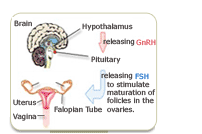34 MENOPAUSE SYMPTOMS |
HEALTH CENTER |
|
| |
|
|
|
| |
|
|
Certain causes of infertility are untreatable, but several factors that increase a woman's risk for infertility that are in fact completely preventable or reversible. Being aware of these risk factors will help a woman to improve her chances of becoming pregnant. Keep reading below to learn about common risk factors for female infertility.
|
- After age 30, a woman's ability to become pregnant progressively decreases, due to declining ovarian activity and decreased hormone production. Older women are not only at a greater risk for infertility, but also for miscarriage and birth defects if the pregnancy is carried to term. After age 35, men are also at an increased risk for infertility.
- Smoking appears to increase risk both for infertility and for miscarriage, and will also make a women less receptive to fertility treatments.
- A leading cause of infertility in American women is being overweight and leading a sedentary lifestyle.
- Women with a lower than normal body mass index (as can occur in female athletes or women with eating disorders) are often unable to conceive. Women following a very low-calorie, low-fat diet and strict vegetarians are also at a greater risk for infertility, as they may be lacking important vitamins, like vitamin b12 and folic acid.
- Women with a high caffeine intake appear to be at a greater risk for infertility, as well as miscarriage.
Women who have one or more of the risk factors for infertility should take steps to reduce this risk by changing their lifestyles, or considering alternative treatments or medical procedures to augment their fertility. Keep reading to learn about the best treatment options for infertility.  |
|
|
|
|
|
Some causes of infertility are irreversible, but women can improve their chances for conception by making lifestyle changes and taking other steps to balance their hormonal levels. Keep reading to learn more about different treatment options for improving fertility. |
|
|
|
|
|
Improving fertility with MacaActive Supplements |
|
Hormones play an essential role in both a woman's ability to become pregnant and to carry a pregnancy to term. After age 30, hormonal production in women begins to decline, thus decreasing fertility. As women begin to notice the symptoms of hormone deficiency, they may want to consider taking steps to stabilize their hormonal production.
Today, there are three effective ways to normalize hormonal levels: lifestyle changes, alternative medicine and drugs & surgery.
|
|
 |
Lifestyle Changes: This first level of treatment involves no risk, but may be the hardest way to go because you'll have to restrict yourself from many things. That's why most people consider the next level of treatment, alternative medicine, which has proven to be excellent for treating menopausal symptoms in a safe and natural way.
|
|
 |
Alternative medicine: There are two types of herbal supplements for balancing hormone levels and decreasing the risk for infertility: those containing phytoestrogenic herbs, and those containing non-estrogenic herbs. Phytoestrogenic herbs (like Black Cohosh) are filled with phytoestrogens, which are similar to estrogens. They can increase low estrogen levels by replacing some of the missing estrogen hormones. This isn't the best solution, however, because your body will become less responsive to producing estrogen on its own, causing a further decrease in body-own hormone levels. Unlike phytoestrogenic herbs, non-estrogenic herbs don't contain estrogen, but they nourish the hormonal glands to work more efficiently. This ultimately results in balancing not only estrogen, but other necessary hormones, as well. Using non-estrogenic herbs is one of the safest and best ways to treat menopause symptoms naturally.
An excellent example of a safe and effective non-estrogenic herb for hormonal imbalance is herbal MacaActive. What makes MacaActive so special is its ability to balance hormonal levels in women by nourishing the hormonal glands. In this way, balances hormonal levels and improves fertility.  to read more about MacaActive. to read more about MacaActive.
|
|
 |
Drugs and Surgery: This level of treatment has the highest risk and often the highest cost. The most common drug therapy in the US is hormone replacement therapy (HRT). There's no doubt that this is the quickest and strongest way to combat hormonal imbalance. Unfortunately, it entails serious side effects and increases the risk of different types of cancer in women. If you still want to consider this approach, see your doctor to become better informed about what this treatment option involves.
|
|
A safe way for balancing hormones:
Non-estrogenic herbs are the most effective solution for treating hormonal imbalance and improving fertility.
MacaActive is an excellent non-estrogenic herb. It's simple: rather than putting hormones from the outside into your body artificially, MacaActive stimulates your hormone glands into producing the necessary hormones naturally. This is what makes MacaActive supplements so unique.  to read all about MacaActive. |
 |
|
 |
|
|
|






